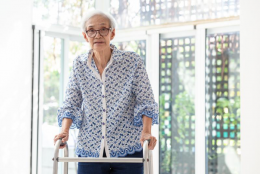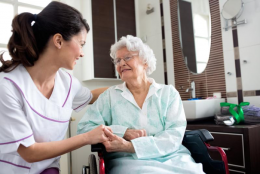How to Look Your Best and Take Care of Yourself at the Same Time
Many senior citizens develop a utilitarian view of clothing over time, primarily looking for items that serve a practical purpose. However, you can still look great while staying on top of important health factors such as temperature regulation and fall prevention. Read on to learn how you can look your best while taking care of yourself at the same time.
Hats
Hats can make a bold fashion statement as well as offer some much-needed sun protection. If your hair has thinned over the years, hats will protect your scalp from UV damage and help to emphasize your facial features. Avoid visor hats that feature an open crown since these don’t offer your scalp any coverage. As a general rule, base your hat choices around your stature so that you look well-balanced. Don’t wear a tiny hat if you’re tall or full-figured. If you like to wear earrings, then match them with your hat for a stylish look. On sunny days, pick a hat with a wide brim such as a graceful pool hat or a handsome fedora to give yourself some shade. For colder weather, beanies and berets are good choices to help preserve your warmth.
Shoes
Shoes with good support have been shown to decrease the risk of falling, especially those that have a high-quality tread to provide grip and support. Heels, flip-flops, sandals, and shoes with slick soles are best avoided, as they tend to contribute to greater fall rates rather than to help prevent falls. However, that doesn’t mean that you can’t pick shoes that make a fashion statement as well! Some casual walking shoes can add a sporty edge to your outfit, and a well-fitted pair will work wonders to alleviate joint pain. There are also a number of supportive open-toe shoe styles that are great for summer as well as dressier shoes with different types of leather that can change the whole look of your outfit.
Dress in Layers
Dressing in layers is a great way to feel your best, not only because of the stylish looks you can create but because of the increased ability to regulate your temperature. During the summer, wearing a lightweight, cotton shirt with long sleeves will help to prevent dangerous sun exposure while helping you to create a cohesive look. In the colder autumn and winter months, dressing in layers is imperative to temperature regulation. You’ll want to be able to put layers on to go outside, and then remove the outer layer or two to stay comfortable indoors as well.
Make the most of your golden years by looking your best while you take care of yourself. Collect a few stylish hats that will help protect you from the weather, and get some comfortable shoes that look as great as they feel. Lastly, make the most of layered outfits so that you’ll be able to stay comfortable no matter what the weather throws your way.
How to Make Sure Assets Are Distributed According to Your Loved One’s Will
No one wants to be part of a contested will distribution. Losing a loved one is difficult enough, and then facing a legal battle over their estate can be very traumatic. Let us share a few tips with you to guide you through the process of ensuring your loved one’s wishes are followed.
Make Sure it’s Valid
According to Rocket Lawyer, for a will to be legally binding, it must satisfy certain basic requirements. These requirements have been put in place to prevent fraud and forgery. A valid will must be recorded in writing, signed and dated by the person who made it and signed by a witness. Anything that has been added to the will after it has been signed is not valid and cannot be enforced. Any changes made to the will also need to be composed properly and signed in front of a witness. A valid will always requires a valid signature and date, although this signature does not necessarily have to be notarized. Finally, at least two competent adults must sign the will for it to be valid. In most states, a person who is in line to inherit would not be considered a valid witness.
Have an Asset Protection Plan
Estate planning normally determines how a person’s assets will be distributed when they die. According to Legally Mine, while typically assets are distributed according to a will, complications can often arise, especially if there are substantial assets on the line. A comprehensive estate plan will include many things, and an important area is asset protection. The best way to protect assets is to think for the long term with discretionary lifetime trusts or mandatory income trusts. To avoid complications, always obtain advice from a qualified lawyer who specializes in asset protection and wills.
The Choice of Executor Matters
Choosing the executor of a will is an important life decision. According to Extra Mile, you should discuss this with your loved one prior to the end and encourage them to have two executors. It is best if one person is a nonrelative such as a financial planner or lawyer. In addition, be sure that the provisions include a disclosure requirement that will force the executor to provide all details of the estate. Following these guidelines will allow for a safe process of property distribution.
Keeping each of these areas in mind will protect the integrity of your loved one’s wishes. Consulting with an attorney who specializes in estate planning is an excellent option in confirming all details before the will is finalized. With these things in mind, the process should proceed as intended.
Here’s another article we think you’ll like: 3 Ways Families Can Support and Protect Their Senior Loved Ones
3 Ways Families Can Support and Protect Their Senior Loved Ones
Your senior loved ones were always there for you. Now, it is your turn to return the favor and give them the support they need as they get older. As adults age, they become more vulnerable to physical, emotional, and financial difficulties that can rob them of their independence, but you can help protect them. Here are three ways to support and protect your senior loved ones.
Visit Often
It’s highly likely that your senior loved ones are reluctant to ask for help. They want to manage their own lives, yet they still need engaging and meaningful relationships. Older adults of all ages are susceptible to loneliness—especially if they’ve lost a spouse or the ability to drive. Visits from family provide essential emotional support and prevent the type of social isolation that can negatively impact a senior’s cognition and overall health.
Visiting your loved one at their home helps you to discern how a loved one is taking care of themselves, but planning regular outings also helps seniors stay active. Visits on holidays are appreciated, but spending time together planning celebrations together is particularly beneficial.
Keep Track of Finances
Monitoring a senior loved one’s finances can help protect them from financial abuse. Older adults are trusting and generous, making them top targets for scams. Experts suggest that as much as 20 percent of seniors are affected. Stolen identity, home title fraud, insurance hustles, and investment schemes are all popular forms of financial exploitation.
Clues that a senior loved one has been affected included late payment notices, collection calls, unusual numbers of home deliveries and a dwindling checking-account balance. To keep seniors safe, review important rules, such as safeguarding personal information and not responding to spam emails. If your senior loved one is cognitively impaired, ask if you can help them monitor their mail and financial accounts.
Plan Ahead
For many seniors, the day comes when they can no longer manage their own affairs independently. If plans aren’t in place for their care, necessities such as establishing a power of attorney and advanced directives become significantly more difficult. Helping loved ones plan in advance ensures that their choices are respected, and it makes it easier for family caregivers to get them the assistance they need.
Supporting a senior loved one can be challenging, but the more help they have from family members, the longer they can remain independent and enjoy the life they deserve. It’s the least you can do to help make sure they are comfortable after all they’ve done for you throughout your lifetime. By taking steps like the ones above, you can help make sure that your senior loved ones are happy and taken care of.
Lost Mobility? Don’t Give Up!
If you or a loved one struggle to walk, stand, or reach, remaining mobile can be difficult. While it is very tempting to give up, staying in bed all day is something you should never do. A pessimistic attitude only makes matters worse and can cause you to forgo the many benefits of even minimal movement.
The Mentality of Giving Up
When you are homebound, it can be easy to adopt the mindset of literally being bound to your home. Whether this is a comfortable armchair or your bed, emerging from such a self-styled nest can be difficult. When negative thoughts and feelings of hopelessness take center stage in your mind, doing anything can become seemingly impossible. If you can hardly move, why should you bother to look presentable, put on shoes, or get to a medical appointment? Hopelessness combined with little or no movement can possibly lead to depression.
The Importance of Movement
Bedsores directly lead to nearly 60,000 deaths a year. Fortunately, it is possible to move yourself to a better outlook and a better life. Add more movement to your day. Even limited movement can have many mental and physical benefits. Movement boosts mood, lowers blood pressure, and improves the function of every major organ system. As you move more today than you did yesterday, you will set yourself on a path towards feeling and looking better. Getting to a physical therapy appointment can give you safe ways to add more movement to your day.
The Slow, Sure Path to Success
There is no time like the present to get on a slow, sure path to success. If you are unable to make it to a professional movement specialist, there are still many ways to move more today. If you currently spend your days lying in bed, try sitting up for a while. Even if you are sitting in bed, you are using different muscles to support your body. You can also periodically perform arm lifts or hand squeezes. If you sit for hours, increase your energy with some easy chair exercises.
While moving, leave any pessimistic attitudes in the dust. When you chose to be optimistic, you can enjoy more energy and a body that functions optimally. Whether you are moving from lying to sitting or sitting to standing, adding more movement to your day is a good move for your mind and body.
If you are struggling with mobility issues and are in a wheelchair, you’ll want to make your home more accessible. Check out these tips that can help you make that happen!
5 Critical Questions to Ask When Choosing an Assisted Living Facility
Making the decision to move a loved one out of their home, away from their family and friends and into an unfamiliar building full of unfamiliar people, to spend what is usually the rest of their days, is difficult and traumatic enough on its own. Knowing how to identify the best facility that will provide the best quality of life and care can be even more intimidating, especially when new facilities are popping up by the dozens, dazzling in flashy colors and fancy décor to distract you from what’s really important: Quality of Care for mom and dad.
But finding the right place for mom or dad can be pretty easy if you can answer these 5 simple questions during your tour.
1. Is there an active Residents Counsel?

Many people often overlook the most powerful and effective player when it comes to making major changes in facility operations and controlling the standard of quality and care of the residents of the community: The residents, themselves.
In communities where quality of care is superior to all others in the area, you’ll almost always find a Residents Counsel made up of concerned and outspoken residents in the facility. Look at is as something of an HOA where the residents hold the facility and their staff (including their leadership) accountable for everything.
Whether or not there is an active Residents Counsel should be the first thing you ask – and verify! – on your tour. If the answer is Yes, you’re already off to a good start.
2. Is their Visiting Physician an actual Doctor?

When it comes to the care received by mom and dad, it’s almost always going to begin with a doctor who regularly visits the facility, meets with residents, diagnosis any issues and makes decisions for care moving forward. This added value to facilities is great for your loved ones who won’t have to leave the facility for their doctor visits, but there’s a dirty little secret most facilities don’t want you to know: A lot of times, that physician isn’t even a real doctor!
In many facilities, the person seeing your mother or father is an APRN (basically a nurse). Having a nurse visit your relative isn’t inherently a bad thing. The entire industry of Home Healthcare is built around that very practice. It is, however, dishonest and unethical for someone to represent themselves as something they’re not. If the visiting not-actually-a-physician is lying to your family about who they are, what else are they lying about?
We can tell you: Your right to choose.
While these faking clinicians don’t work for the facilities directly, they are generally in a business partnership with them, specifically introduced by a Home Healthcare Agency to act as a gate-keeper for any other care providers.
How this nefarious practice works is pretty simple: The Home Healthcare Agency introduces their not-a-doctor stooge to be the “preferred” [exclusive] “physician” [not actually] of the facility. The lying clinician then has a monopoly on the visiting physician duties of the residents (which is bad enough because now the residents are being robbed of actual physician care) and then passes all nursing business to the Home Healthcare agency who brought them in, establishing a total monopoly of care and a total violation of patients’ right to choose their healthcare provider.
So why is this allowed? What does the facility get out of this deal? Usually nothing good. If a healthcare company abandons all notions of morality, you can imagine what their notions are on the actual quality of the care they’re supposed to provide. Bad care only reflects poorly on the facility and generally the facility loses business in the long run, but by then it’s almost always too late for their leadership to do anything about it.
Almost always, this arrangement isn’t made an owner-operator level. The owners of facilities are generally large corporations who leave the day-to-day operations to the local directors of those facilities. Almost always, those directors are being bribed under the table by the devious Home Healthcare agencies with expensive dinners, exotic vacations and other personal perks.
How is this legal? It isn’t. But reporting them is almost impossible, so it’s best to simply just avoid them altogether.
During your tour, ask who the preferred visiting physician is. The facility will have their marketing material on hand. Whip out your phone and check out their website. Look at their staff. Their founder/owner should be an MD. Most of their staff should be MDs. If they’re mostly APRNs, you already know who you’re dealing with.
3. Are their in-house Physical Therapists actually Therapists?

Physical Therapy (PT) is a huge industry, especially in Assisted Living Facilities where the majority of care needs in facilities are PT related. Much like “visiting physician” scandal mentioned above, there’s another sneaky tactic opportunistic and dishonest Home Healthcare Agencies have done, involving 3rd party in-house physical therapists.
A lot of facilities have a room dedicated as a PT/Wellness clinic. Usually, this room is staffed by a separate company. This allows facilities to provide in-house PT services to their residents while potentially collecting rent on the room. It’s a great business model and there’s nothing inherently wrong with it. So, of course dishonest Home Healthcare agencies found a way to poison it to fill their pockets.
What they do is partner with a PT group who will rent the space and then refer all other nursing duties to that Home Healthcare Agency, again effectively blocking all other care providers and robbing residents of their right to choose.
It’s a dishonest practice that requires a dishonest PT company. So what dishonest practice does this dishonest PT company do to benefit from the deal? Because they now have the monopoly on the PT services in the facility and they can charge residents or bill to Medicare or insurance whatever they want, they generally staff the rooms (assuming they’re staffed at all) with Physical Therapy Assistants (PTA) instead of actual Physical Therapists. They then charge standard rates for Physical Therapists for the care provided at the PTA level. Once again, the HHAs and their crooked partners are presenting themselves and charging residents and Medicare as something they’re not.
Again, if your facility has an in-house PT/Wellness clinic, ask for the marketing material and do your due diligence, researching the PT group running the clinic. Check their staff and licensures. If they’re mostly PTAs, that’s who will be seeing your family, but you can rest assured they’ll be billing and collecting on much more than that.
Not all Home Healthcare Agencies are created equal. A few Home Healthcare Agencies like Welcome Homecare staff their own Physical Therapists who are licensed PTs. If they aren’t the active preferred provider in the facility, it’s possible to request them or have the Residents Counsel petition to have them made the preferred provider or operator of the clinics to ensure all residents receive qualified PT care.
4. Is their primary Home Healthcare Agency actually 5-Star?

As stated above, these questionable relationships almost always originate at the Home Healthcare level. When touring the facility, the Home Healthcare Agency with the most nurses (you’ll see their logos on their clothes or badges) is generally the preferred agency. And again, the facility should have their marketing material on hand.
Dishonest agencies will represent themselves as something they’re not. They’ll claim to be five star and usually accompany that with “quality of care.” This is a metric they actually rate entirely themselves and rely on no outside input. Believe it or not, that’s an industry standard. But there is a rating they can’t fake or rate themselves: Patient Satisfaction. And they can’t hide it either.
You can find the HHA’s patient satisfaction star rating (along with a lot of other great information) on Medicare’s website by typing in the HHA’s name or zip code you’re in. You can also see how many patient surveys were collected to reach their star rating. Remember that any rating according to less than 100 surveys is not statistically valid.
Unless there are no 5-Star agencies in the area (highly unlikely) there is absolutely no reason for a facility to not prefer a 5-Star patient satisfied agency. If the preferred HHA of the facility isn’t the highest rated in patient satisfaction, you should ask the Executive Director why they should receive your business if they’re not committed to providing your relative with the best care in the area.
And then you should leave, because any answer they give you won’t be the honest one.
5. Is the Facility actually Local?

Assisted Living is a booming business. Over 100 facilities have popped up in North Florida alone and there is no sign of that climb stopping any time soon.
Many of these facilities are owned by national corporations. There’s something to be said of that success, but it could also mean the people who actually care about future of their business are not directly involved with the future of your family members.
Usually, these large corporations leave the facilities under the management of management companies and local staff and they only meet every once in a while over the phone to get reports. Often times they aren’t getting an accurate read on the situation because the local staff don’t want to be honest with their personal benefits from nefarious dealings that will ultimately have long-term negative effects on the facility long after they’ve moved on to other jobs in other companies.
You can tell how a facility is owned by looking at their website and seeing what locations they have. If their corporate offices aren’t in your area, that’s a pretty sure sign they aren’t locally owned.
If their facility checks off the previous 4 questions with good results, that may not be a problem. But if the last 4 questions leave you wanting, you might have better luck choosing a locally owned and operated facility where your concerns will have a better chance reaching the eyes and ears of the people who can make a difference.
You can see why choosing the right place for mom and dad can be tough. But it doesn’t have to be impossible and you don’t have to do it alone. Companies like Welcome Homecare have done a lot of the vetting for you and have partnered with only the most honest and upstanding facilities and transitionary agencies in the area dedicated to residents’ choice.
If you are concerned about making the best decision for mom and dad, we’re here to help. Contact us any time.
4 Things You Definitely Need Going into Retirement
Retirement is something that everyone in the workforce looks forward to with feverish anticipation. However, retiring doesn’t mean that all responsibilities will magically go away. It’s still up to you to make sure you’re well prepared. These are four things you need to cover as you head into retirement.
Money
Nest eggs are a pivotal aspect of preparing for retirement. You should have around $1 million squared away for retirement. The younger the age that you’re at when you’re reading this, the better. You should use the time to your advantage. If you’re looking at your annual income and wondering how you’ll possibly be able to turn it into a six-figure retirement income, consider that there are routes beyond your traditional paycheck to retirement solvency. You should start looking into investments as a means of beefing up your financial portfolio.
Long-Term Care Insurance
Advancing in age is one of the scarier parts of retirement. However, it can be made far less scary by purchasing long-term care insurance. This helps cover you for ailments that require constant care, such as Alzheimer’s disease. It’s also essential to help cover the costs of residential care. Having this insurance in place early in retirement won’t cost a lot, and will give you more options for choosing home health care services later in life.
A Place to Live
When you’re retired, you don’t have to check into a retirement home immediately. However, you might need to scale down your living situation. Instead of living in a mini-mansion, you might opt for a more reasonable apartment. You might also choose to live in a place like Florida that has better weather than you’re accustomed to as well as a thriving retirement community. If you’re living in the Jacksonville area and are in need of regular healthcare, you can always count on us to help provide you with home-based healthcare services.
A Dream
You might be surprised to find that not having to clock into work doesn’t mean that your happiness will suddenly skyrocket. Ambition doesn’t just disappear because you’ve retired. If anything, this is your time to really seize the day. Put together a list of things that you’ve always wanted to do that retirement will allow for. This could be traveling around the world, learning a new skill, or working on a long-term passion project, such as writing a book. There are all kinds of things that you do to make the most of your retirement.
View your retirement as not the end of one chapter of your life but the start of a new one. It’s your chance to give yourself more freedom, but that freedom can only be felt if you take advantage of it promptly. Covering these four matters will greatly help to enhance the sweetness of retirement.
How to Choose a Good Home Health Care Provider
If your loved one is beginning to need more help at home and you can’t be there all the time, a home health care provider can lend much-needed assistance. However, you may feel intimidated by the process of trying to select a reliable, trustworthy worker. The following criteria can help guide your selection process.
Talk to Other Patients
Current clients can be some of the best sources of information about how good a home health care service is. According to Kindley Firm, elder abuse is sadly an increasing phenomenon as the population ages, so you may feel unsure about whom to trust. Consulting recent references can ease your fears. Ask other families questions about the activities that the provider did with the patient, the strengths they exhibited and their attitude toward the job. You should also ask the reference to describe a time that the care provider faced a problem or emergency.
Look at Online Reviews
Looking at reviews using search engines is a quick way to get a feel for how past customers feel about a service, but reviews are only worthwhile if they’re reliable. To gauge whether reviews are legitimate, consult multiple review sites. As Batzner suggests, you should steer clear of reviews that sound almost exactly alike or ones that gush over every aspect of a service. When a provider responds professionally and pleasantly to reviews, especially ones that involve criticism, that can be a positive sign.
Look at Response Time
Health problems don’t always fit neatly into a 9-to-5 schedule, so it’s important to have the ability to reach your caregiver and receive an answer quickly. For example, some of the best caregiving companies use telehealth monitoring so that they can identify a problem right away, and they also offer an around-the-clock contact number. Furthermore, good home health services schedule appointments quickly so that you can have your loved one seen within 24 hours when it’s necessary.
Consider Credentials
Education and training can help a caregiver provide appropriate services. Good agencies offer providers who are licensed as LPNs or RNs, so you can trust that they have received thorough training as health care providers. Also, some organizations employ occupational or physical therapists to provide well-rounded care for your loved one.
You need to have full confidence in your care provider. You want to make sure that your loved one is well-taken care of in their elderly years. Diligently evaluating a service can help you entrust your loved one’s care to a reliable, professional team.
3 Things That Might Be Contributing to Your Digestive Issues
One of the unfortunate side effects of the aging process is the host of digestive issues that often accompany this season of life. As you age, many body functions begin to slow down and deteriorate. While it may be tempting to brush off the issues as a natural part of aging, it is important to make attempts to identify the problem and treat it. Here are three of the most common things that might be contributing to digestive issues in yourself or a senior member of your family:
Medicine
Regardless of if it is over the counter or a prescription, medicine can wreak havoc on the digestive system. Seniors need to be extra cautious of fillers and additives if they have food intolerances. Fortunately, there are a variety of steps that seniors can take to help to mitigate these digestive issues. Taking the medicine along with food will help to prevent nausea. Medicines that cause constipation can be combined with fiber supplements to negate these issues. Prescription medicines such as penicillin are prone to causing diarrhea and should be taken with a probiotic or foods that are high in lactobacillus.
Dentures
Missing teeth and poorly fitted dentures reduce bite force and can contribute to the development of Irritable Bowel Syndrome (IBS). Seniors with dentures need to be careful to diligently chew their food. Poor digestive issues begin in the mouth. One common condition associated with dentures is aerophagia. This excessive swallowing of air can lead to a severely distended stomach, poor digestion, and pain. Dental implants can help with digestive issues by supporting biting strength and chewing stability.
Diabetes and Gastroparesis
Diabetes is a common ailment in the aging population. This condition is a common cause of gastroparesis, a disorder distinguished by food taking a long amount of time to clear the stomach. People who suffer from gastroparesis experience symptoms such as nausea, vomiting, heartburn, and discomfort at the top of the stomach. This disorder cannot be cured and can only be managed through medication and proper diet. People with severe cases of the disorder often have to resort to tube feeding to get their nutrients because their stomach cannot process the food effectively.
Seniors do not have to suffer through the discomfort. The first step in treatment is a proper diagnosis. By recognizing the most common causes of digestive disorders in seniors, you can take steps to alleviate the issue.
Welcome Homecare Ranks Top 20% HHAs in America
Welcome Homecare has earned the 2018 SHPBestTM “Superior Performer” Patient Satisfaction Award
Jacksonville, FL, 6/18/2019 – Welcome Homecare has been recognized by Strategic Healthcare Programs (SHP) as a “Superior Performer” for achieving an overall patient satisfaction score that ranked in the top 20% of all eligible SHP clients for the 2018 calendar year.
The annual SHPBest™ award program was created to acknowledge home health agencies that consistently provide high quality service to their patients. The 2018 award recipients were determined by reviewing and ranking the overall satisfaction score for more than 2,500 home health providers. With the largest HHCAHPS benchmark in the nation, SHP is in a unique position to identify and recognize organizations that have made patient satisfaction a priority and have been rewarded for their efforts with high marks on the HHCAHPS survey.
“SHP is proud to present the SHPBest awards to our top-performing customers. We commend these organizations for their continuous focus on delivering the highest quality of care to their patients”, said Rob Paulsson, President of SHP.
Welcome Homecare has serviced Jacksonville residents, physicians and assisted living facilities for over 30 years, as one of the original Home Healthcare providers in the city. From being the first agency to go all in on silver coated foley catheters to bringing the first tele-health monitoring devices into the homes of Jacksonville patients, Welcome Homecare has a history of leading the industry with cutting-edge technologies, spearheading the charge to improve the quality of home health in the greater Northeast Florida and beyond. This along with Welcome Homecare’s dedication to 5-Star service for their patients has made the agency an icon of the community and their standard the standard in Patient Care.
“As a locally owned and operated family business, we are so proud of our nurses and clinical staff for their unwavering dedication to serving our patients with integrity and love. Plenty of agency’s have mottos, but few actually practice what they preach. We owe this great honor to our team, who have consistently put their heart into home care and shown the city that, when it comes to our patients, we aren’t almost family – we are family. We look forward to many more years of providing 5-star service to the community in Jacksonville, Orange Park, Fernandina, St. Augustine and Macclenny”, said Dwight Cenac II, Director of Marketing for WHC.
Read more about the SHPBest awards program, including methodology and award recipient lists at https://www.shpdata.com/home-health/shpbest-hhcahps.
About Welcome Homecare

Welcome Homecare is Jacksonville’s longest-running premiere home healthcare agency, with the only Medicare-backed 5-Star Patient Satisfaction record of over 300 patient surveys. For over 25 years, Welcome Homecare has serviced the greater Jacksonville area as well as Fernandina, Macclenny, Green Cove Springs, St. Augustine and Orange Park. Welcome Homecare offers a variety of home healthcare services to bring the highest quality care to patients’ homes including skilled nursing, physical therapy, occupational therapy, speech therapy and telemonitoring.
About Strategic Healthcare Programs (SHP)
Strategic Healthcare Programs (SHP) is a leader in data analytics and benchmarking that drive daily clinical and operational decisions. Our solutions bring real-time data to post-acute providers, hospitals, and ACOs to better coordinate quality care and improve patient outcomes. Since 1996, SHP has helped more than 7,000 organizations nationwide raise the bar for healthcare performance.
3 Recent Advancements in Medical Technology to Help You Feel Younger
Aging is a difficult process that affects all people. Over time, the human body naturally begins to lose some of its strength and abilities. While this process cannot be stopped, it can be slowed down, allowing seniors to be active longer than previous generations were able to do. By taking advantage of recent advances in medicine, seniors can live more actively and more confidently.
Heart Monitoring
Heart disease is the most common cause of death in the United States. For some people, symptoms like shortness of breath or struggling with activity build over time. For others, a cardiac event comes without warning. It used to be that routine heart monitoring could only happen in a medical setting. Now patients can wear portable monitors that record their information and send it directly to a doctor. This kind of biofeedback can even be synced to a smartphone, allowing doctors to reach out to patients if something unusual is detected.
Hearing
Hearing loss is a common symptom of aging. According to Gardens Cosmetic Center, about 36 million people have hearing loss in the U.S., and almost half of them are under the age of 65. In recent years, hearing aid technologies have improved in the ability to compensate for hearing loss as well as in appearance. Modern hearing aids for age-related hearing loss can be quite small and can be worn without notice. They can also be adjusted for the needs of the patient whether it is compensating for lost range or filtering out background noise.
Joint Health
Staying active is one of the keys to feeling young. However, the aging process tends to take away flexibility. Many seniors also have to deal with osteoarthritis and joint pain. As the Baby Boomers age, much more research has been done to help seniors deal with painful joints. Physical therapy techniques have improved, increasing mobility in a more natural way. There are many more interventions that are not as invasive as a full joint replacement. For example, according to VeryWell Health, arthroscopic surgery can repair some problems with a very small incision. At the same time, joint replacement technology has also improved so that artificial joints last longer, giving seniors better mobility for many years.
Modern medical technology is helping older adults live active and productive lifestyles. Common medical issues can be diagnosed, monitored, and, in some cases, corrected far more quickly than in previous years. With advances in medicine, seniors can stay vigorous and curious well into their golden years.
















